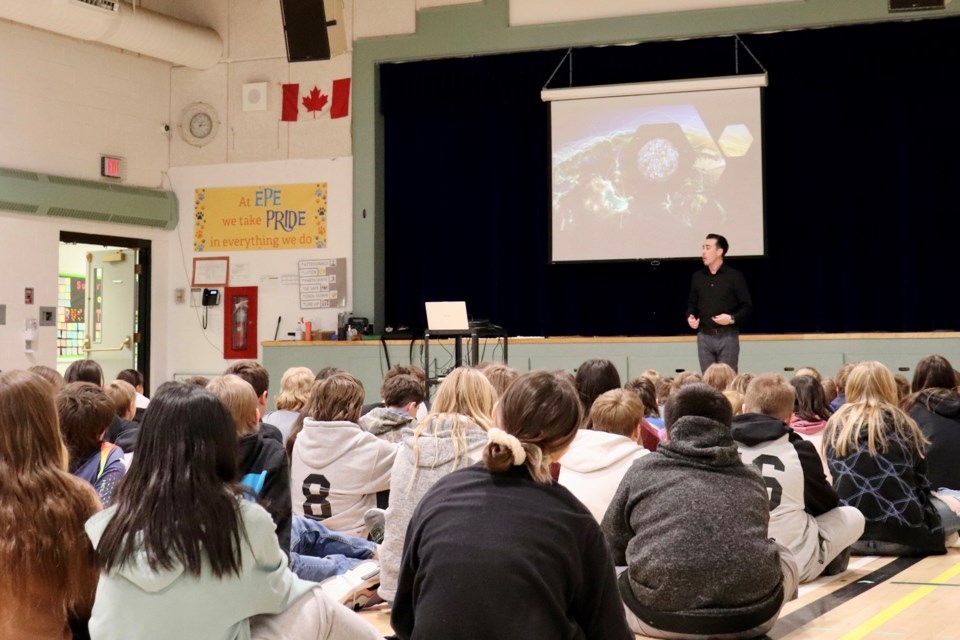ST. PAUL - Fully aware of the importance of mental health, St. Paul Education has been focusing its efforts on a specific area of mental health – social media and technology.
“A big focus for our division this school year is the impact of technology on mental health,” according to Bridget Severin, Counselling and Communications Coordinator with St. Paul Education.
“As access to technology increases, so does the need for education on how to use it safely. We want our students to be equipped with the skills to be good digital citizens and make positive choices when using devices and social media,” she explains.
Simply put, staff at schools in the area have noticed an increase in issues related to the inappropriate use of technology.
“The consequences of making mistakes online can have significant impacts to the mental health of children and youth. Sometimes these issues require RCMP involvement or other community supports. Increased screen time can also cause feelings of stress and anxiety as well as negatively impact sleep,” says Severin.
From April 17-19, students took part in presentations specific to the topic of digital citizenship and the use of technology.
“As part of the work we are doing with our Mental Health in Schools pilot, we arranged for Safer Schools Together to facilitate sessions on digital safety to all students in Grades 4-12," says Severin.
Topics covered include:
• Digital media habits/impacts
• The permanence of online posts/activity
• The importance of caring for peers both online and offline
• Geo-locational settings and the dangers of social media and cell phone misuse
• The consequences for cyberbullying behavior as well as privacy breaches
• The significance of your digital tattoo in how others perceive you (e.g., sports teams, college admissions, and potential employers)
The presentations also aligned with the new K-6 Physical Education and Wellness curriculum in the areas of Character Development and Safety.
“In a post-survey completed by our junior and senior high schools, a majority of students indicated they learned something new from the presentations,” says Severin. “Our hope is that students will use this information to make safer choices and create a positive digital footprint or tattoo.”
One of the most important topics around digital safety is “reaching out for help.”
Whether it is a parent, teacher, coach or other trusted adult, it is vital that children and youth know that it is important to talk to someone when they encounter unsafe situations online.
Since parents play a key role in helping children and youth build positive digital habits, Safer Schools Together also facilitated a session for parents on April 18 at Portage College.
“The presenter [Tyler Lum from Safer Together Schools] expanded on information shared in the student sessions and also provided tips on how to approach online safety as a family. Parents were encouraged to educate themselves, set technology limits, reiterate technology is a privilege not a right, and most importantly, engage in conversations with their children about social media and technology use,” explains Severin.
St. Paul Education has also developed a Digital Citizenship Curriculum based on lesson plans from Common Sense Media. Health teachers teach the lessons to students in Grades 2-10.
Mental Health in Schools pilot
“Just like physical health, everyone has mental health. It begins at birth and continues throughout life. Good mental health is not merely the absence of mental health problems,” according to the Government of Alberta’s Mental Health in Schools website.
In response to improving students’ mental health, the province has launched a pilot project, dedicating millions of dollars to the cause. Through the project, the Government of Alberta is supporting close to 80 mental health pilot projects over the next two years.
“The projects will encourage student well-being through new and innovative approaches to providing supports and services like counselling, social and emotional learning, student assessment, family- and parent-oriented supports, and training for school staff,” according to the Government of Alberta.
Up to $50 million has been allocated to the Mental Health in Schools pilot.
Humane Technology
Among the resources provided to parents at the April 18 presentation was a link to the Center for Humane Technology website.
One of the key focuses of the Center is how technology can have an impact on attention and mental health. According to information from the Center, the use of technology can result in increased anxiety, higher rates of depression, loneliness, lower self-esteem, a decreased attention span, and a lower quality of sleep.
“Platforms and apps, like YouTube, often provide a feeling of community. When used for genuine connection, it can be a valuable tool. However, these platforms take advantage of our instinct to belong,” according to the Center for Humane Technology. “We become conditioned to seek regular and constant feedback with likes, comments, and shares. This creates a cycle of increased social media use and a decrease in mental health.”
Mental Health Helpline: 1-877-303-2642 This toll-free helpline provides confidential and anonymous services, crisis intervention, information about mental health services and referrals to other agencies.



